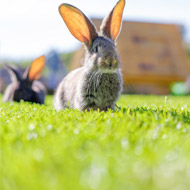
Tunnels found to be most effective
Stress falls by almost 50 per cent in rabbits when enrichment activities are present in their environment, according to a study by Harper Adams University.
Research conducted by student Amy Johnson, who is studying for a BSc in Bioveterinary Science, shows a significant difference in rabbits’ stress indicator, cortisol, when given enrichment activities like balls, boxes and tunnels.
Amy found the most effective item for relieving stress was a tunnel, which allowed the rabbits to hide. But there was only minimal difference compared to other activities.
In the study, Amy observed eight rabbits for five days so that she could measure the ‘control level’ of cortisol. The rabbits were kept in pairs and had large runs to exercise in.
Amy then put an enrichment activity in with each pair of rabbits for five days. The activity was removed at the weekend so the rabbits’ cortisol levels could return to normal before the next activity was introduced.
“I decided to use faeces to monitor the cortisol levels, instead of blood, because it is less invasive,” said Amy. “The rabbits are used to being cleaned out by people, so it did not add any extra stress.
"When an enrichment activity was present in the rabbits’ environment, their cortisol levels dropped by almost half.”
Amy was not able to carry out a behavioural study, but says it is something she would like to explore if she did the research again.
“I would imagine the animals would be showing more natural and less nervous behaviour which would reduce the chances of rabbits becoming aggressive to their owners,” she said.



 The latest
The latest